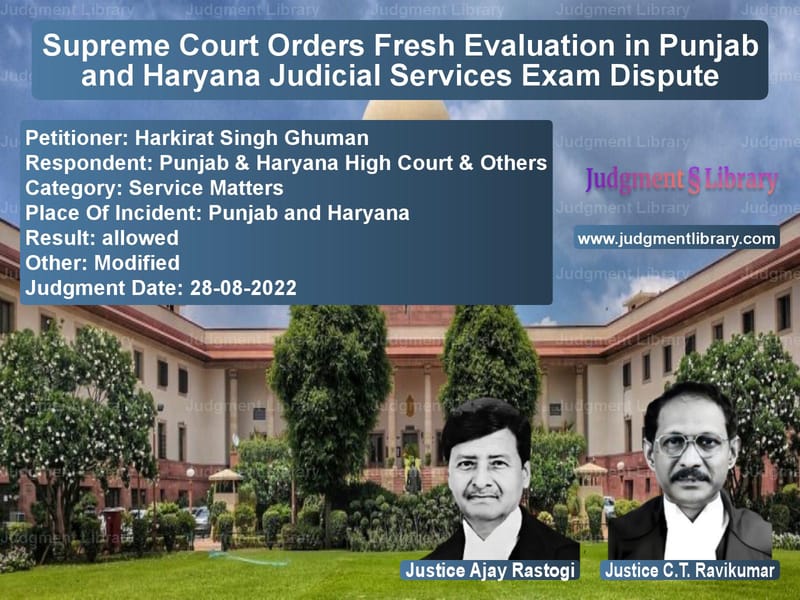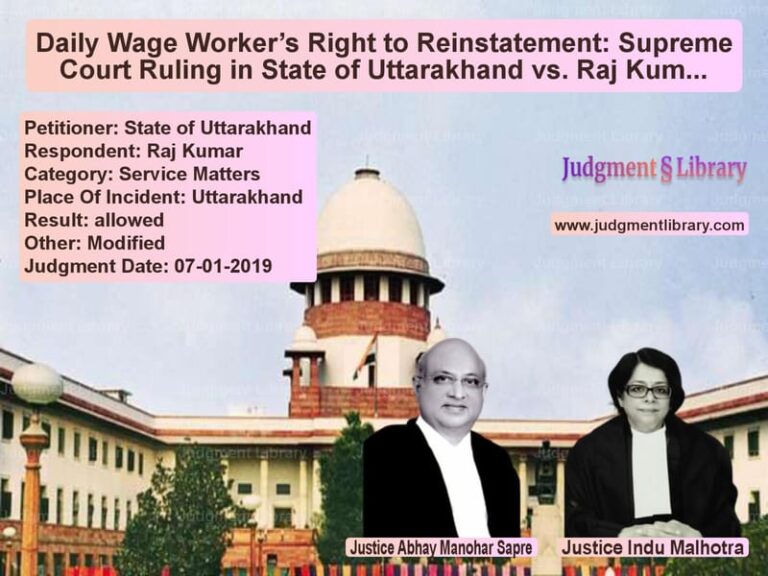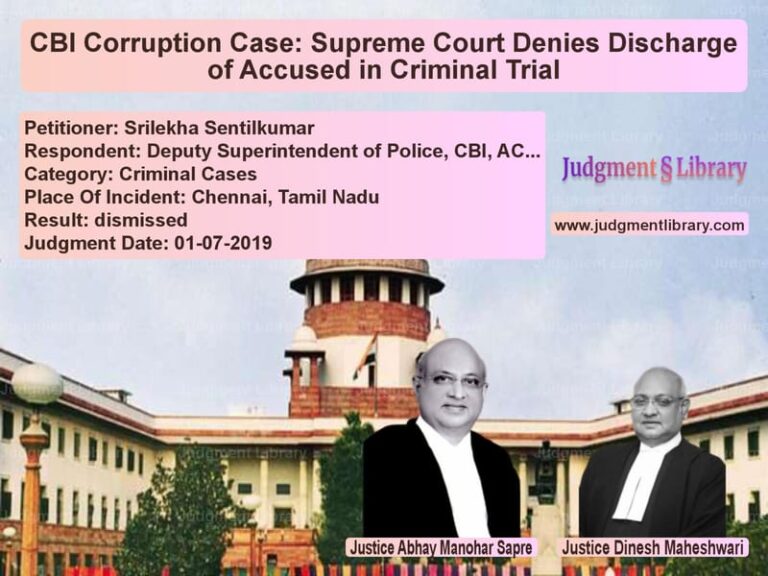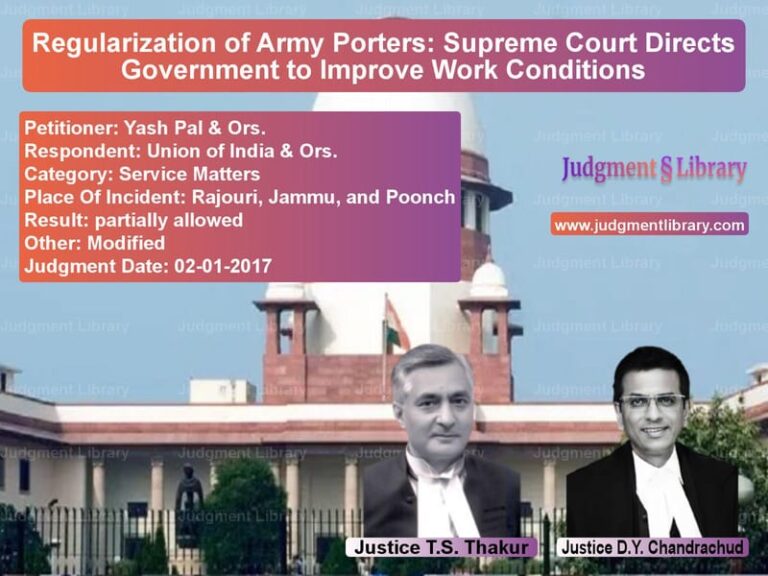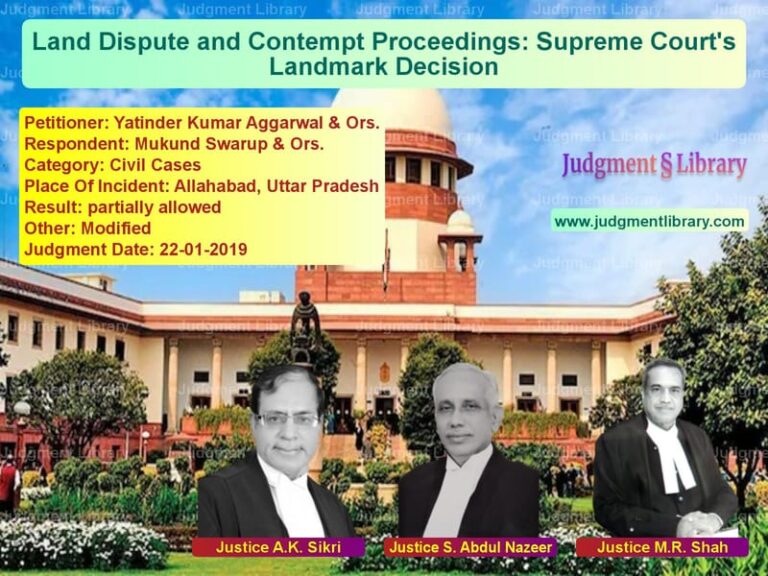Supreme Court Orders Fresh Evaluation in Punjab and Haryana Judicial Services Exam Dispute
The Supreme Court of India, on August 29, 2022, delivered a landmark judgment in the case of Harkirat Singh Ghuman vs. Punjab & Haryana High Court & Others. The case revolved around the recruitment process for the Punjab and Haryana Superior Judicial Services Examination, 2019, where discrepancies in the evaluation process were challenged.
The appellant, Harkirat Singh Ghuman, had challenged the selection process, citing irregularities in the examination, particularly in Paper V (Criminal Law) and Paper VI (General Knowledge). The Supreme Court directed fresh evaluation of certain sections of the written examination while ensuring that fairness and transparency were maintained in the recruitment process.
Background of the Case
The Punjab and Haryana High Court issued separate advertisements for direct recruitment to the Punjab and Haryana Superior Judicial Services, 2019. The recruitment process was governed by the Punjab and Haryana Superior Judicial Services Rules, 2007. The selection process involved:
Read also: https://judgmentlibrary.com/m-p-medical-officers-pay-scale-dispute-supreme-courts-landmark-judgment/
- A written examination.
- A qualifying viva-voce.
A total of 348 candidates participated in the selection process, with 118 candidates appearing for the Punjab judicial services and 230 for Haryana.
Issues Raised by the Appellant
The appellant raised several objections concerning the examination process:
- Errors in Paper V (Criminal Law): The question paper was incomplete, with Question No. 4 missing. A supplementary paper containing this question was handed out after one hour of the exam.
- Issues in Paper VI (General Knowledge): The multiple-choice format did not provide clear instructions on how to attempt the paper.
- Non-disclosure of Marks: The appellant’s request for marks under the Right to Information (RTI) Act was denied.
- Alleged Haste in Evaluation: The appellant argued that the results were declared within 17 days, raising concerns about possible bias.
Arguments by the Petitioner
Senior Advocates appearing for the appellant contended:
- The error in Paper V (Criminal Law) created confusion among candidates, violating fairness in the examination process.
- Not providing an Optical Mark Recognition (OMR) sheet in Paper VI denied candidates the opportunity to verify their answers.
- The refusal to disclose written marks under RTI was arbitrary.
- The evaluation process was conducted too hastily, undermining transparency.
Arguments by the Respondents
The Punjab and Haryana High Court, representing the examination authorities, countered:
- Despite the error in Paper V, the level playing field remained unaffected.
- Instructions were provided in Paper VI, and candidates were made aware of the marking scheme.
- Under Punjab and Haryana Right to Information Rules, marks could not be disclosed before the selection process was completed.
- The timeline for evaluation was justified given the number of candidates and the marking process.
Supreme Court’s Observations
1. Error in Paper V (Criminal Law)
The Court found merit in the appellant’s contention that Question No. 4 was missing and later introduced via a supplementary sheet:
“The inadvertent human error in Paper V cannot be overlooked. However, instead of canceling the entire examination, we direct that only the answers to Questions 1, 2, 3, and 5 (totaling 160 marks) be evaluated, and Question 4 (40 marks) be excluded.”
2. Transparency in Multiple-Choice Examinations
The Court emphasized that recruitment authorities should adopt better practices for multiple-choice exams:
“In future, candidates should be provided with an OMR sheet and question papers should be made available post-examination to maintain transparency.”
3. Right to Information and Evaluation Timeline
The Court ruled that non-disclosure of marks under RTI before completion of the selection process was justified:
“In cases where viva-voce follows a written exam, premature disclosure of marks can lead to allegations of bias and favoritism.”
4. Re-Evaluation and Declaration of Results
The Court directed:
- The respondents must re-evaluate Paper V, excluding Question 4.
- The fresh merit list must be published.
- Candidates who qualify in the revised result should be called for viva-voce.
- The entire process must be completed within two months.
Final Judgment
The Supreme Court allowed the appeal and ruled:
“The appeal succeeds, and the impugned judgment of the High Court dated January 23, 2020, is set aside. The recruitment process shall proceed based on the revised evaluation.”
Impact of the Judgment
The Supreme Court’s ruling has far-reaching consequences for public service recruitment:
- Ensures fairness in examinations: Errors in question papers must be rectified in a manner that does not disadvantage candidates.
- Enhances transparency: The recommendation for OMR sheets and answer keys promotes accountability.
- Clarifies RTI applicability: Candidates can access their marks only after the selection process is complete.
- Prevents arbitrary disqualification: The exclusion of Question 4 instead of canceling the exam saves time and resources.
Conclusion
The Supreme Court’s judgment in Harkirat Singh Ghuman vs. Punjab & Haryana High Court is a landmark ruling ensuring that recruitment processes remain fair, transparent, and accountable. The Court’s directions for fresh evaluation and timely result declaration uphold the principles of natural justice, benefiting not just the candidates involved but also setting a precedent for future recruitment examinations.
Petitioner Name: Harkirat Singh Ghuman.Respondent Name: Punjab & Haryana High Court & Others.Judgment By: Justice Ajay Rastogi, Justice C.T. Ravikumar.Place Of Incident: Punjab and Haryana.Judgment Date: 28-08-2022.
Don’t miss out on the full details! Download the complete judgment in PDF format below and gain valuable insights instantly!
Download Judgment: harkirat-singh-ghuma-vs-punjab-&-haryana-hig-supreme-court-of-india-judgment-dated-28-08-2022.pdf
Directly Download Judgment: Directly download this Judgment
See all petitions in Recruitment Policies
See all petitions in Public Sector Employees
See all petitions in Promotion Cases
See all petitions in Judgment by Ajay Rastogi
See all petitions in Judgment by C.T. Ravikumar
See all petitions in allowed
See all petitions in Modified
See all petitions in supreme court of India judgments August 2022
See all petitions in 2022 judgments
See all posts in Service Matters Category
See all allowed petitions in Service Matters Category
See all Dismissed petitions in Service Matters Category
See all partially allowed petitions in Service Matters Category

